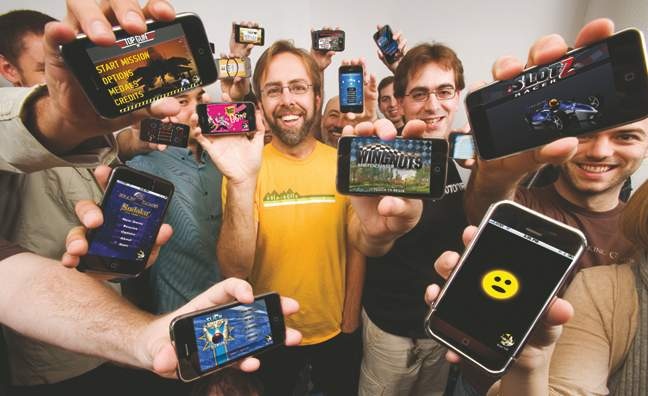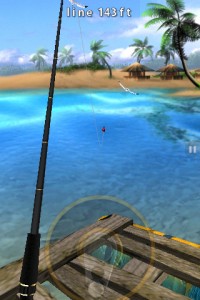 As a followup to yesterday’s inteview with ngmoco CEO Neil Young, this morning we spoke with Freeverse President Ian Lynch Smith to hear what the recent purchase of Freeverse by ngmoco means to them. The full audio is attached below, but here is a summary of the talk.
As a followup to yesterday’s inteview with ngmoco CEO Neil Young, this morning we spoke with Freeverse President Ian Lynch Smith to hear what the recent purchase of Freeverse by ngmoco means to them. The full audio is attached below, but here is a summary of the talk.
Originally founded in 1994, Freeverse’s earliest titles were Mac shareware games. They later branched out in to games for Windows, XBOX Live Arcade, and most recently the iPhone. Freeverse’s MotoChaser was one of the few 3D games that launched with the App Store. Also immediately available were Big Bang Sudoku and Jared. They then went on to release a catalog of great iPhone games, both developed in house and and by outside developers published by Freeverse.

Photo by Crain’s New York Business
Since the surprise announcement yesterday of ngmoco’s purchase of Freeverse, what we’ve all been wondering is what is going to change. Ngmoco has recently shifted gears to an entirely free to play business model, while Freeverse has been happily releasing massively successful 99¢ games like Skee-Ball and Flick Fishing while working on highly anticipated games such as Warpgate.
The short answer of what is going to change initially is almost nothing, with very little changing in the future aside from the shift in payment models. According to Ian Lynch Smith, they wouldn’t have done the deal if it wasn’t for the shared vision between both companies, as each of them focus on the iPhone and iPhone OS. This doesn’t mean they’re abandoning the Mac games, applications, and everything else they do either. Freeverse will remain its own company in Brooklyn, just as a wholly owned subsidiary of ngmoco.
 In addition, Freeverse will continue to publish the works of other iPhone developers, with the same level of quality and care we’ve seen in the past. As Smith put it, “[Ngmoco] did not buy Freeverse to make radical changes. They bought us because of our success, and they bought us because of what we’ve been doing right."
In addition, Freeverse will continue to publish the works of other iPhone developers, with the same level of quality and care we’ve seen in the past. As Smith put it, “[Ngmoco] did not buy Freeverse to make radical changes. They bought us because of our success, and they bought us because of what we’ve been doing right."
From Freeverse’s perspective, the main motivation behind agreeing to this deal is the immense potential for growth. Through the years they’ve done everything they could to reach a larger audience, originally starting with shareware, then making the jump to retail shelves, then bringing their games to both the PC and XBOX, and finally jumping on the iPhone.
In regards to ngmoco’s recent push to “freemium" games, Smith said, “We wouldn’t have done this if we didn’t think there wasn’t more growth and more possibilities to reach more people in the free to play model." He cites people (now teenagers) who have grown up playing high quality free flash games as well as the massive successes seen in Asian markets as proof that the free to play model works.
Ian seems open to all forms of free to play games currently, including a one-time purchase to unlock all the features and functionality of a game– Something often requested by forum members regarding ngmoco’s TouchPets and Eliminate. Freeverse has no intention of “nickel and diming" gamers, and plans on just being smart about how these things are implemented.
While he was reluctant to comment on future game development, when asked if they were still going to provide substantial gameplay experiences for gamers to enjoy instead of Farmville-like games, Smith simply responded “Yes" and mentioned a “substantial game" being discussed behind the scenes.

Freeverse admits they have much to learn about the free to play world, but with the combined expertise of ngmoco, they hope to release compelling games that can be played at no cost to the player, while providing optional in-game purchases for players who spend hours a day playing. They’re hoping this will result in games that see the same exponential growth that the iPhone in general has enjoyed, instead of the current linear growth patterns Freeverse sees now.
Prior to this recent acquisition by ngmoco, Freeverse has never had investors and has been profitable on their own for the last 15 years. According to Smith, the main motivation for agreeing to the purchase was to “swing for the fences" and feels we’re at a major moment in time, an inflection point, where we’re going to see an explosion of mobile gaming.
“At the end of the day, we are just trying to sell our games in a way that lets us grow and continue making more games," Smith explained.
We recommend listening to the entire interview yourself, which is included here.
Podcast music provided by Overclocked Remix.
Interview Audio: Subscribe in iTunes or Direct Download (M4A, 12.9MB)